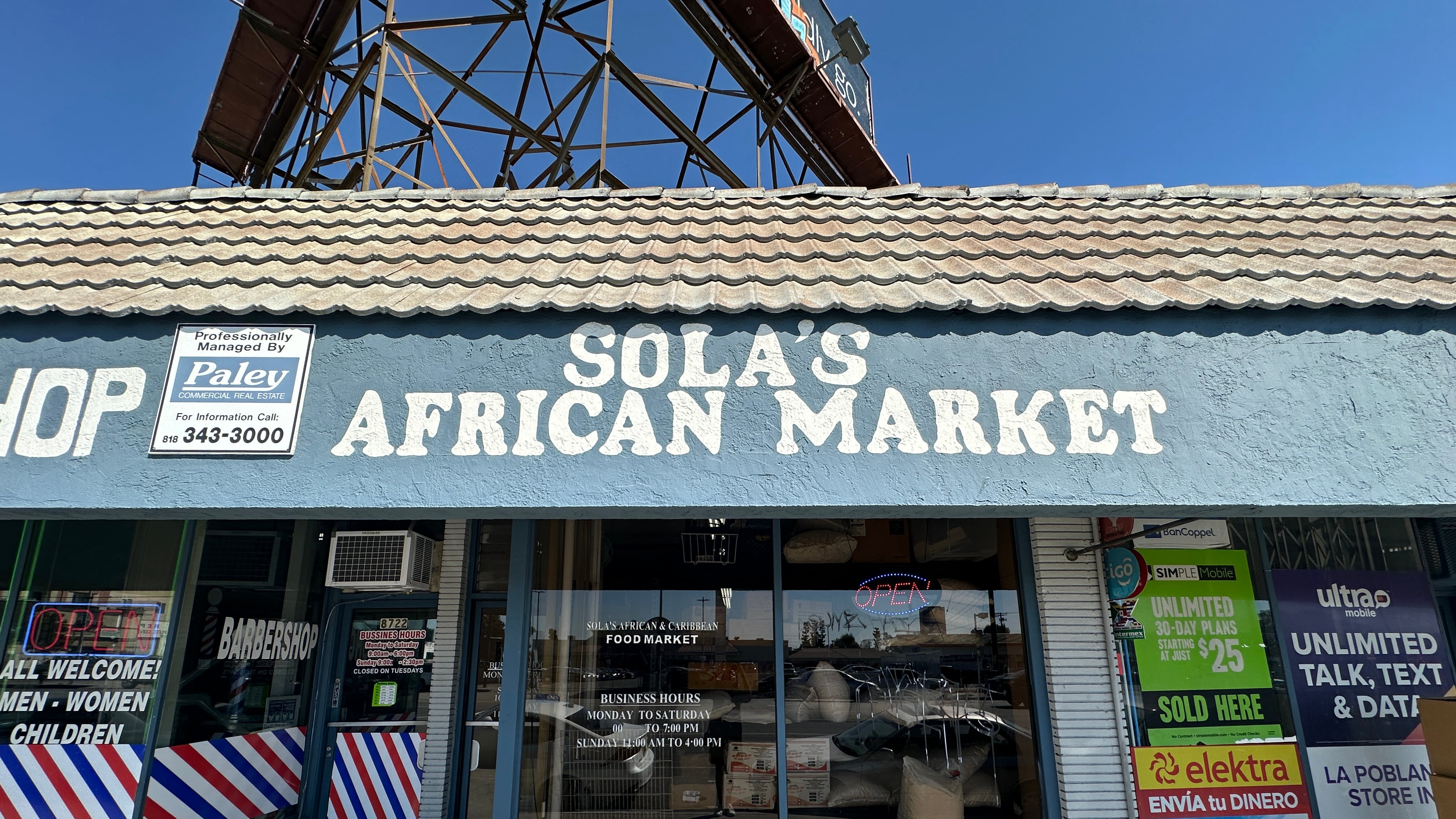On the bustling street of Sepulveda Boulevard in the San Fernando Valley, Sola’s African Market is nestled between a barbershop and cellphone store. The store has West African ingredients of all kinds: fufu flour, garri and frozen cassava leaves.
Towards the back of the store, Karimot Jolaoso rests in a dark brown reclining chair.
Around two years ago, she fell and broke a bone, leading her to use a walker.
Luckily, managing customers at the shop does not require too much energy from Jolaoso. And on a quiet afternoon like this one, the store isn’t too busy.
Jolaoso shared that the store is named after her middle name, Sola. Sola’s African Market can be seen in bold white letters against a faded blue awning.
In an interview with Annenberg Media, Jolaoso reflected on her life and journey to becoming the owner of this small but mighty African market.
When she came to the United States as an international student — first at Pasadena City College, then West Los Angeles College — she studied accounting and soon after worked at a bank.
Jolaoso then pivoted to nursing, a career she thought gave her flexibility to spend time with her son. Growing up in Nigeria, Jolaoso said she always knew she wanted to be a nurse. As a child with polio, Jolaoso says she was in and out of the hospital all the time.
“People were taking care of me and I wanted to pass that on to someone else, and I was really happy to do it. I love taking care of people,” she said.
However, Jolaoso found that starting Sola’s African Market was well-suited for her life as a parent.
“That’s why I started the business, mainly to be able to take care of my child. I wanted to spend more time with him,” she said.
Jolaoso said she bought the business from a friend back in 2002. Her friend was selling products at a swap meet, and Jolaoso turned this side hustle into a storefront just a few blocks away in 2003. She moved into her current location three years later.
Since then, Sola’s African Market has welcomed all those seeking African and Caribbean ingredients and beverages. “When people come to my store, once you walk in through that door, you’re family,” Jolaoso said.
Jolaoso said it is not just Africans who come to the store, but also Brazilians, Mexicans and Cubans who buy cola nut, palm oil and the well-known Nigerian moin-moin.
“Everyone comes here and their families. Seeing that and seeing my people is one of the biggest joys of owning a business,” Jolaoso said.
In the store, customers can also find body care products like African black soap, clothes with common West African prints and beverages like Vita Malt.

Compared to states on the East Coast, California has a small West African population. Notably, New York has the highest concentration of African-born people in the United States, according to Pew Research Center.
The difference between the East Coast and West Coast was something Annmarie Easy, a USC senior from New York who is half Ghanaian and half Jamaican, immediately noticed.
“When I’m back home and walk down the block, I can find two African markets, maybe three,” she said.
Here in L.A., with fewer markets and grocers to serve the community, it’s not unusual for West Africans to get ingredients from people of different cultural backgrounds.
Asian grocery stores like 99 Ranch Market and Seafood City have Sierra Leonean staples such as cassava leaves and potato leaves.
Sarieu Metzger, a nurse who is half Sierra Leonean and half Gambian, said she gets fresh potato leaves, krain krain leaves and bitter leaves, all used for Sierra Leonean dishes, from a Vietnamese vendor at her local farmers market in the San Fernando Valley.
Metzger said because the market is only around May to October of each year, she keeps the stem of the potato leaves to plant them in her own backyard.
Jolaoso, meanwhile, said she purchases some products for her store from a wholesale market in Downtown L.A. owned by Latines.
For some first-generation Americans, food may be the only way to connect with their culture, but some immigrant parents are concerned about whether their culture will carry on.
Metzger said her daughter, who was born in Africa but raised in Los Angeles, does not seem interested in the food when Metzger cooks it. “She barely eats any of this food,” Metzger said.
However, young African people in L.A. still find ways to maintain and celebrate their culture.
Easy said she and her friends cook African food for their annual “friendsgiving” celebration.
“Let’s just give ourselves a home away from home and cook for each other.”
With shops like Sola’s African Market, West African food culture stays alive in Los Angeles for generations young and old.
Jolaoso noted that running the shop is her way of contributing to the African community of Los Angeles.
During hard times, the shop is what keeps her going.
In July 2016, Jolaoso’s only child, Jamal Oladapo, died after being stabbed in the chest. He was a student at L.A. Film School at the time and was in his final year of college.
“He was an only child. That was my life. My son and this business,” Jolaoso said.
Jolaoso credits her community for why she is still in business today.
“After my son passed away, coming here is what helps me,” she said.
Jolaoso says her son was the inspiration for Sola’s African Market more than 20 years ago. Now, eight years after his passing, the market stands strong, keeping West African food tradition alive in Los Angeles, one sale at a time.
